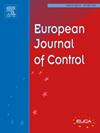Bounded-time nonblocking supervisory control of timed discrete-event systems
IF 2.6
3区 计算机科学
Q2 AUTOMATION & CONTROL SYSTEMS
引用次数: 0
Abstract
Recently an automaton property of quantitative nonblockingness was proposed in supervisory control of untimed discrete-event systems (DES), which quantifies the standard nonblocking property by capturing the practical requirement that all tasks be completed within a bounded number of steps. However, in practice tasks may be further required to be completed in specific time. To meet this new requirement, in this paper we introduce the concept of bounded-time nonblockingness, which extends the concept of quantitative nonblockingness from untimed DES to timed DES. This property requires that each task must be completed within a bounded time counted by the number of , rather than bounded number of transition steps in quantitative nonblockingness. Accordingly, we formulate a new bounded-time nonblocking supervisory control problem (BTNSCP) of timed DES, and characterize its solvability in terms of a new concept of bounded-time language completability. Then we present an approach to compute the maximally permissive solution to the new BTNSCP.
定时离散事件系统的有界时间非阻塞监督控制
近年来,在非定时离散事件系统(DES)的监督控制中提出了一种定量非阻塞性的自动机性质,该性质通过捕获在有限步数内完成所有任务的实际要求来量化标准非阻塞性。然而,在实践中,任务可能会进一步要求在特定的时间内完成。为了满足这一新的要求,本文引入了有界时间非阻塞性的概念,将定量非阻塞性的概念从非定时DES扩展到定时DES,这一性质要求每个任务必须在有界的时间内完成,而不是在定量非阻塞性中有界的过渡步数。据此,我们提出了一个新的有界时间非阻塞监督控制问题(BTNSCP),并用有界时间语言可完成性的新概念来表征其可解性。然后给出了一种计算新BTNSCP的最大允许解的方法。
本文章由计算机程序翻译,如有差异,请以英文原文为准。
求助全文
约1分钟内获得全文
求助全文
来源期刊

European Journal of Control
工程技术-自动化与控制系统
CiteScore
5.80
自引率
5.90%
发文量
131
审稿时长
1 months
期刊介绍:
The European Control Association (EUCA) has among its objectives to promote the development of the discipline. Apart from the European Control Conferences, the European Journal of Control is the Association''s main channel for the dissemination of important contributions in the field.
The aim of the Journal is to publish high quality papers on the theory and practice of control and systems engineering.
The scope of the Journal will be wide and cover all aspects of the discipline including methodologies, techniques and applications.
Research in control and systems engineering is necessary to develop new concepts and tools which enhance our understanding and improve our ability to design and implement high performance control systems. Submitted papers should stress the practical motivations and relevance of their results.
The design and implementation of a successful control system requires the use of a range of techniques:
Modelling
Robustness Analysis
Identification
Optimization
Control Law Design
Numerical analysis
Fault Detection, and so on.
 求助内容:
求助内容: 应助结果提醒方式:
应助结果提醒方式:


